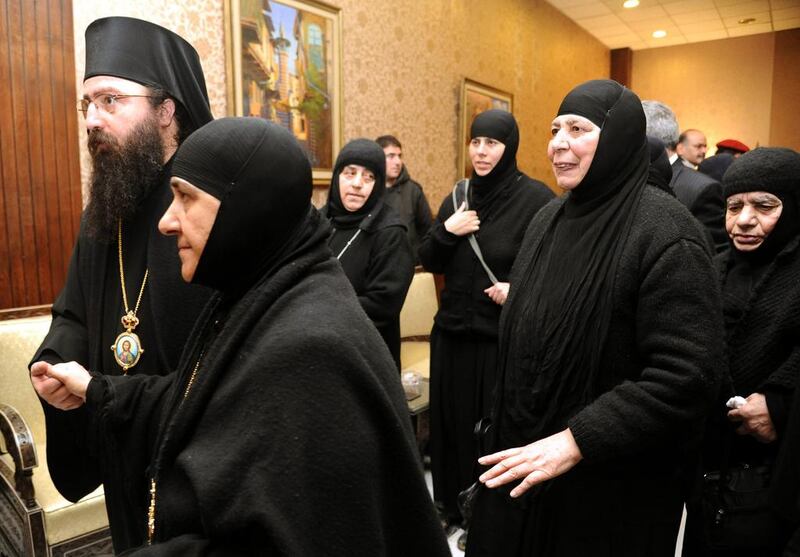DAMASCUS // Greek Orthodox nuns freed after being held hostage by Al Qaeda-linked Syrian rebels arrived in Damascus on Monday, ending their four-month ordeal, Syrian state media reported.
Residents gave the 13 nuns a warm welcome at the Church of the Cross in the predominantly Christian neighbourhood of Qassaa, official news agency SANA reported. They were released early on Monday in a rare deal between the Syrian government and rebels of Al Nusra Front, mediated by the Gulf country of Qatar, traditionally a rebel supporter.
The women said they were well treated and appeared so in a video of their release issued by Al Nusra Front, the group that held them. One elderly nun too weak to walk was carried by a rebel gunman, his face covered with a balaclava, to a nearby vehicle. They thanked God for their safety before heading to the Greek Orthodox Patriarchate in old Damascus, where they will now stay, SANA said.
About 150 jailed Syrian women will be released in exchange for the nuns, who along with three other women were taken from their convent in the Christian-dominated town of Maaloula during clashes in December.
The Syrian Greek Orthodox Patriarchal Assistant, Bishop Luca Al Khoury, who led an official church reception to greet the nuns, accused the rebels fighting to overthrow Syrian president Bashar Al Assad of targeting Syria’s patchwork of religious minorities. Bishop Al Khoury is a frequent defender of Mr Al Assad’s rule.
“Syria, which does not differentiate between Muslims and Christians, is targeted ... by the armed terrorist groups who don’t understand anything but the language of killing and destruction.”
The nuns’ seizure confirmed the fears of many in Syria’s minority Christian community that they were being targeted by extremists among rebels. Syria’s three-year conflict has become increasingly sectarian.
The country’s chaotic mix of rebel groups is overwhelmingly Sunni Muslim, while the minorities include Christians, Shiite Muslims and Alawites — whose sect is a Shiite offshoot. Most have sided with Mr Al Assad or remained neutral, fearing for their fate should rebels take power. Mr Al Assad is an Alawite.
Also Monday, the international rights group Amnesty International accused the Syrian government of committing war crimes and crimes against humanity by blockading and starving civilians in the southern Damascus neighbourhood of Yarmouk.
Amnesty said it estimates 200 people in Yarmouk have died of hunger-related illnesses since a year-long blockade on the area was tightened in July by forces loyal to Mr Al Assad.
Amnesty said its research showed that 128 people starved to death in a report released on Monday.
Forces loyal to Mr Al Assad began blocking the Palestinian-dominated area to flush out rebels and to punish civilians for harbouring them, in a policy the government has used across Syria since the uprising began three years ago.
Efforts to reach a truce in Yarmouk allowing food deliveries to starving residents have repeatedly collapsed.
* Associated Press





